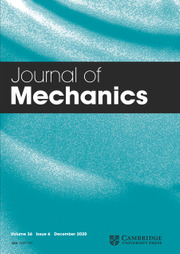No CrossRef data available.
Article contents
Optimum Design of Damped Vibration Absorber for Rotationally Periodic Structures
Published online by Cambridge University Press: 14 April 2016
Abstract
In this study, a damped centrifugally driven order-tuned vibration absorber designed for vibration reduction in rotating flexible structures, bladed disk assemblies and blisk such as turbine blades, compressor and fan blades, pump and helicopter rotor blades etc. during steady operation with constant speed and under engine order excitation (e.o excitation). Effect of mistuning is disregarded. System is assumed with fully cyclic symmetry. The disk is imposed as being rigid. Elastic behavior for blades is supposed. A model with two degree of freedom is extracted for the blades. Each blade is fitted with nominally identical damped order-tuned vibration absorber that is moved in a circular path. Aerodynamic damping and coupling effects between the blades are considered. Optimal values of parameters of the absorber, to suppress blade vibration especially in resonance condition, are derived by Genetic Algorithm (GA) and MATLAB software. H2 optimization criterion is used. It is observed that with the deviation of each parameter from the optimal condition, the system response is moved away from the ideal design situation and all of the absorbers’ design parameters have definite effects on the system frequency response and on the dissipated energy during vibration. Therefore, ignorance of the effect of one of those parameters (which was happened in literature) affected the system response completely. Literature is reviewed and validity of the results is confirmed.
Information
- Type
- Research Article
- Information
- Copyright
- Copyright © The Society of Theoretical and Applied Mechanics 2016

